The Southeast Asia Biodiversity Research Institute of the Chinese Academy of Sciences (CAS-SEABRI) unveils its cover in Nay Pyi Taw on October 12.CAS president Bai Chunli and Permanent Sevretary U Than Myint for Natural Resources and Environmental Conservation of Myanmar unveiled cover of the panel.
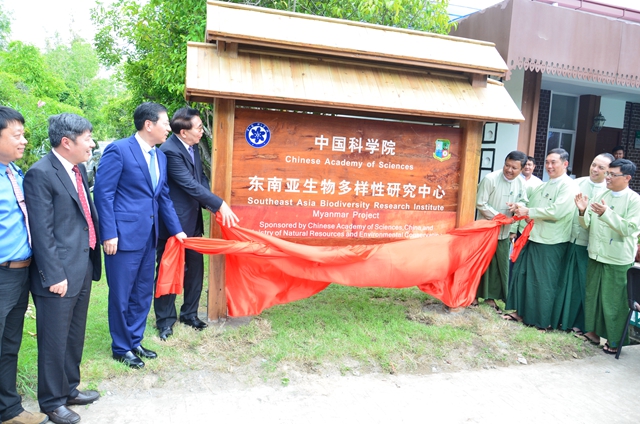
The unveiling ceremony
President Bai Chunli delivered an opening speech. He said that Myanmar is one of the countries in Southeast Asia with richest biodiversity, but lacking in scientific research and conservation of diverse plants and animals. The establishment of the CAS-SEABRI is aimed to provide a model and platform for biodiversity research and conservation in Southeast Asian countries and carry out international cooperation among different institutes. He gave recognition to achievements of the institute over the past year, including joint field biodiversity investigations and personnel exchanges. Bai Chunli encouraged all concerning institutes to join forces with the Ministry for Natural Resources and Environmental Conservation of Myanmar to contribute to regional biodiversity conservation and research.
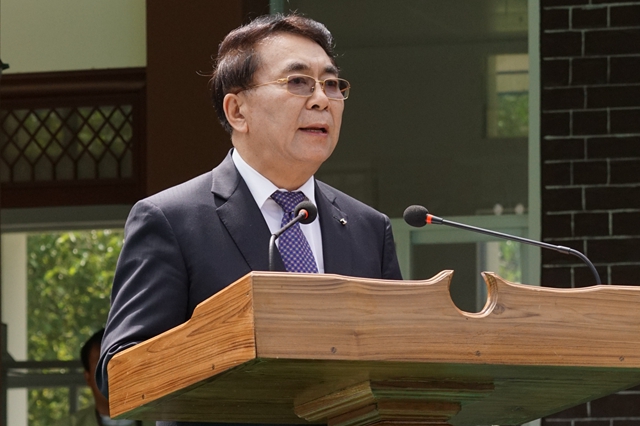
CAS president Bai Chunli addresses the opening ceremony
Prof. Chen Jin, director of Xishuangbanna Tropical Botanical Garden (XTBG), reviewed the process and achievements of CAS-SEABRI up till now. With completion of the office building in Myanmar, the cooperation between CAS institutes and Myanmar is deepened and will be expanded. It is to provide further study opportunities to young science and technology workers from Southeast Asian countries, pursuing master and Ph.D degrees. It aims to become a science and education platform of international force for biodiversity conservation and research in Southeast Asian countries in 10 years.
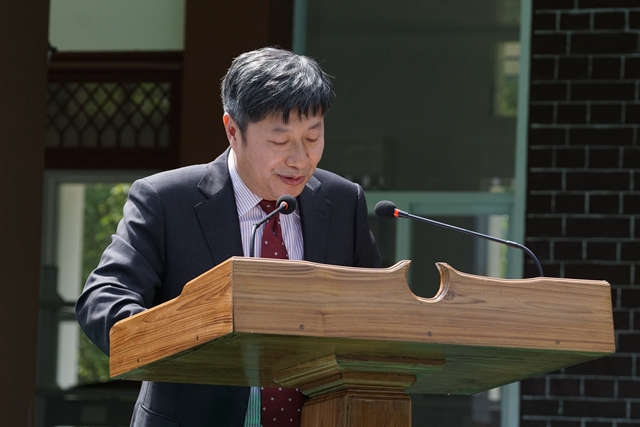
XTBG director Chen Jin addresses the unveiling ceremony
Mr. U Khin Maung Ye, Permanent Secretary for Natural Resources and Environmental Conservation of Myanmar, expressed his belief that CAS-SEABRI will provide opportunity for Myanmar counterpart to improve their capacity.He also said that Myanmar will actively promote the development of CAS-SEABRI and a batch of young scientists is expected to grow up here.
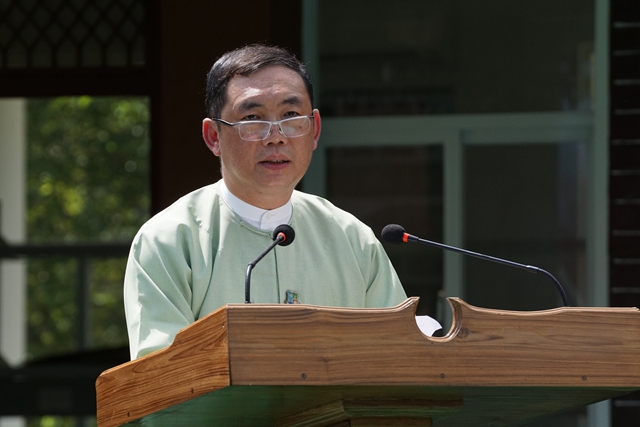
Permanent Secretary U Khin Maung Ye speaks
The CAS-SEABRI has been implemented since 2013 under bilateral Memorandum of Understandings (MoU). It aims to enable international research of biodiversity and science, among the countries along the Belt and Road and Southeast Asia, based on the China-Myanmar cooperation.
The CAS-SEABRI mainly concerns Xishuangbanna Tropical Botanical Garden (XTBG), Kunming Institute of Botany (KIB), Kunming Institute of Zoology (KIZ). Till now, four research groups (plant diversity and conservation; aquatic plant diversity; traditional medicine and ethnobotany; animal diversity and conservation) have been set up.
The opening ceremony of the CAS-SEABRI was attended by CAS president Bai Chunli, Permanent Secretary U Khin Maung Yee, Ambassador Hong Liang, director general Cao Jinghua of CAS Bureau of International Cooperation, director Chen Jin of XTBG, director Sun Hang of KIB, director Yao Yonggang of KIZ, director Thaung Naing Oo of Forest Research Institute of Myanmar, etc.
MORE INFORMATION
The CAS-SEABRI is established under a 3-year MoU signed between XTBG and Myanmar Ministry of Environmental Conservation and Forestry (MoECAF) in June 2013. A new 5-year MoU was signed in 2016.
The CAS-SEABRI was officially launched in August 2015. Prof. Chen Jin is named its director.
Since its inauguration, the CAS-SEABRI has set up four research groups, completed three large-scale field biodiversity investigations, collected 1500 plant specimens of 3500 accessions, observed records of bird and beast species, and 10,000 photos by infrared thermal cameras, found 20 new plant species, 100 new spider species, etc.
Since 2016, many students from Southeast Asian countries come to pursue degrees. At the recommendation of CAS-SEABRI, 13 of them were awarded national or CAS scholarships. A batch of young scientists has improved their capacities through advanced field course in Ecology and Conservation and other workshops.

Ambassador Hong Liang interviewed by media
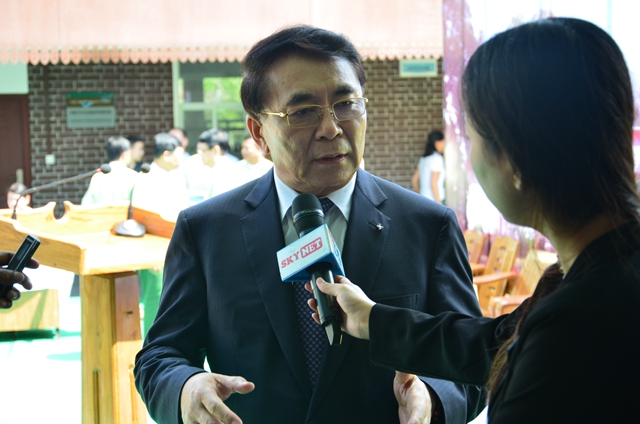
CAS president Bai Chunli interviewed by Sky Net

Bai Chunli and Myanmar officials visit laboratories
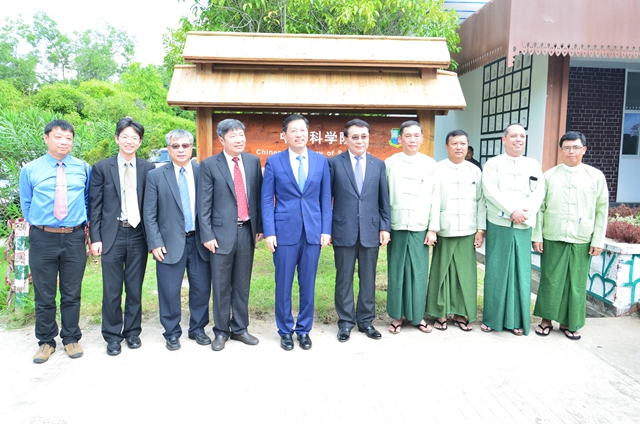
Representatives of CAS and Myanmar pose a photo
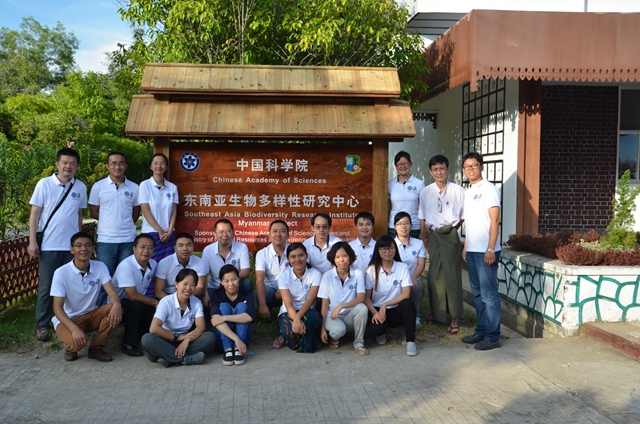
Young researchers at CAS-SEABRI pose aphoto









